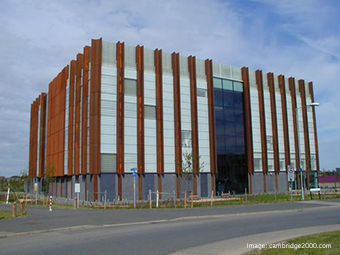
UNIVERSITY researchers based within the so-called “Golden Triangle”, where London connects with the Oxford-Cambridge Arc, have taken leading roles in the UK’s Covid-19 response, including a presence in key initiatives including the government’s Vaccine Taskforce and the private sector led Ventilator Challenge UK.
Three Covid-19 Oxford University-based projects were among the first to benefit from a share of £20m in government investment to fund trials and develop manufacturing processes to produce a vaccine at a million-dose scale. The team at the Jenner Institute is starting clinical testing shortly. A further project will examine how existing treatments could be repurposed to treat coronavirus.
Cambridge’s Covid-19 initiatives include a new testing laboratory being established by AstraZeneca, GSK and Cambridge at the University’s Anne McLaren Building. This facility will be used for high throughput screening for Covid-19 testing and to explore the use of alternative chemical reagents for test kits in order to help overcome current supply shortages.
Meanwhile, the University of Cambridge Department of Engineering has adapted modelling tools originally designed to improve the efficiency of factories to manage the flow of patients at Addenbrooke’s Hospital. Elsewhere at the University, researchers in the department of Computer Science and Technology have developed a new app, which will be used to collect data to develop machine learning algorithms that could automatically detect whether a person is suffering from Covid-19 based on the sound of their voice, their breathing and coughing.
In Milton Keynes, the National Biosample Centre, which was opened in 2015 and is the largest facility in the UK for storing and processing biological samples, has been converted into the UK’s biggest Covid-19 testing centre. Meanwhile, underlining the collaborative approach to R&D, Mologic Ltd, located at Bedford Technology Park, is also working on a Covid-19 point-of-need diagnostic tests with the Liverpool School of Tropical Medicine and St George’s, University of London.
Further joint initiatives are underway to the east of the Arc. Researchers at the University of East Anglia are working with the Queen Elizabeth Hospital in King’s Lynn and the Norfolk and Norwich Hospital to trial a portable coronavirus kit which could be rolled out to test NHS staff in weeks. The trial is led by researchers in Oxford.
Sue Foxley, Research Director at Bidwells, the Cambridge-based property agency, commented: “The embedded culture of collaboration and innovation in the science and technology sector has been fundamental to the advances made. The evidence across the Oxford-Cambridge Arc, ranging from diagnostic testing, manufacturing processes and potential vaccines, illustrates the power of the cluster.”